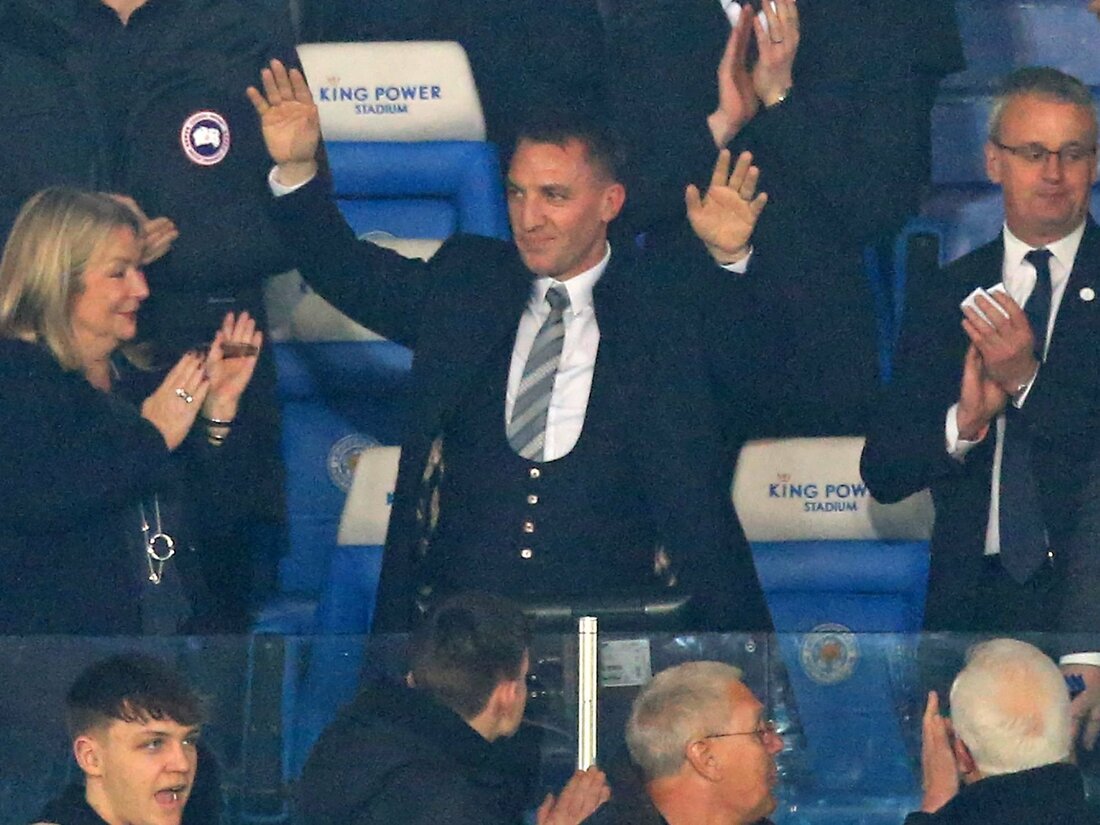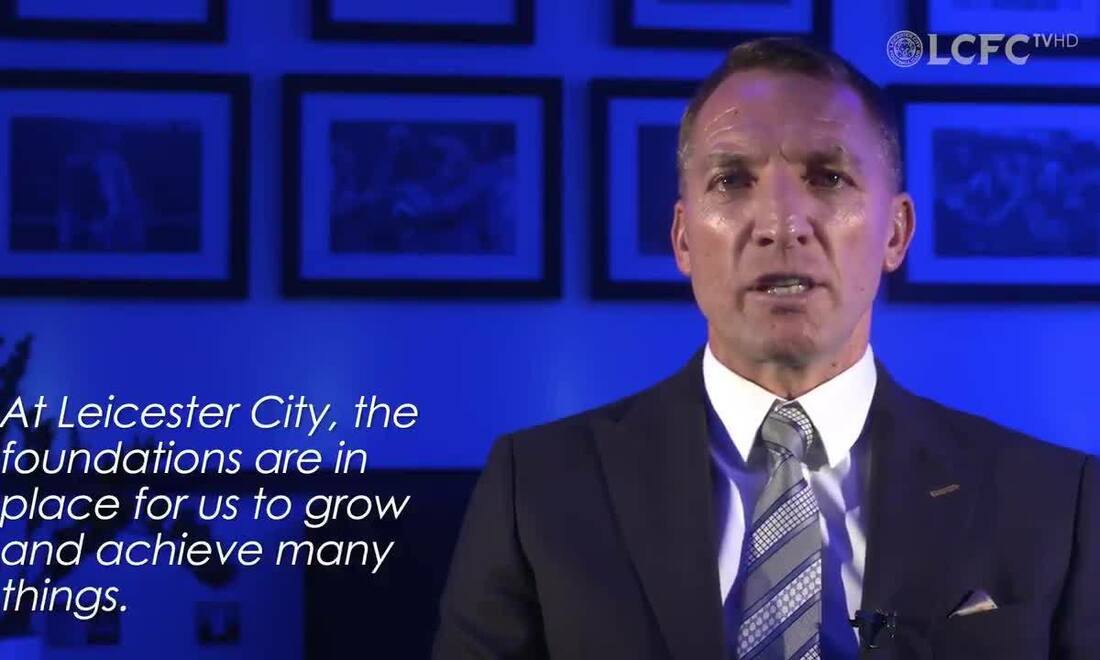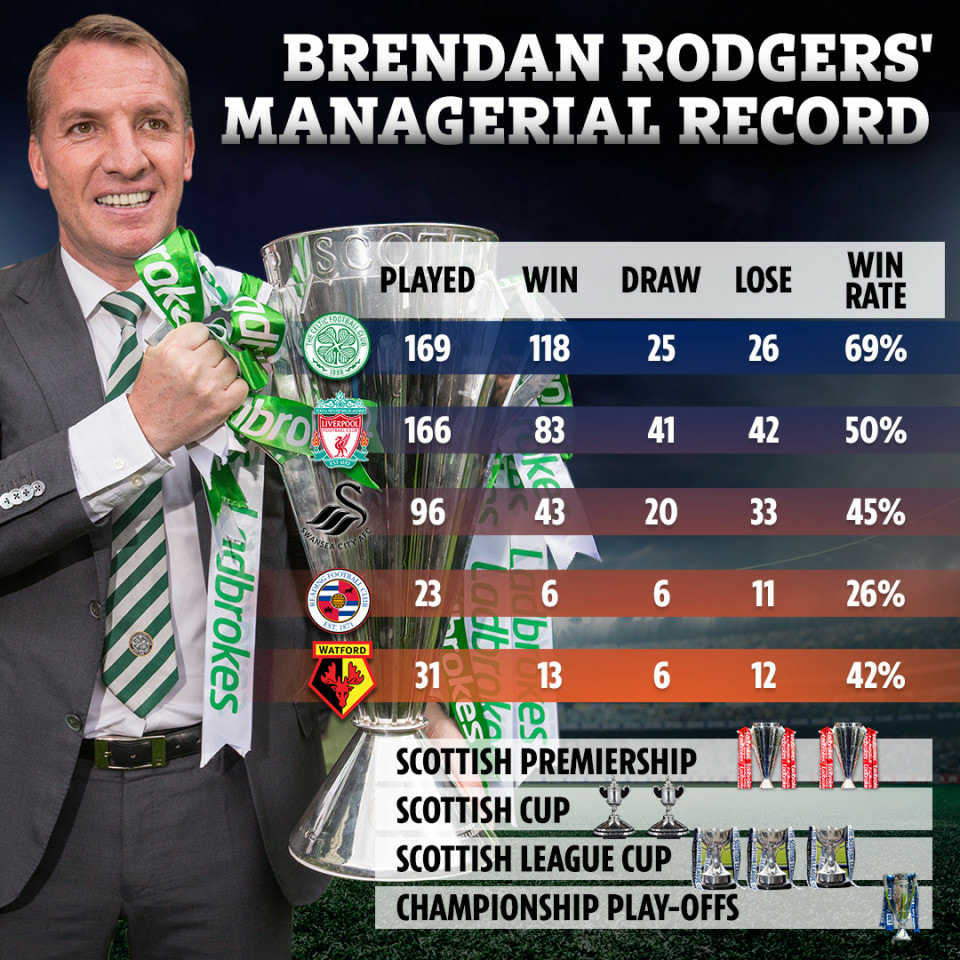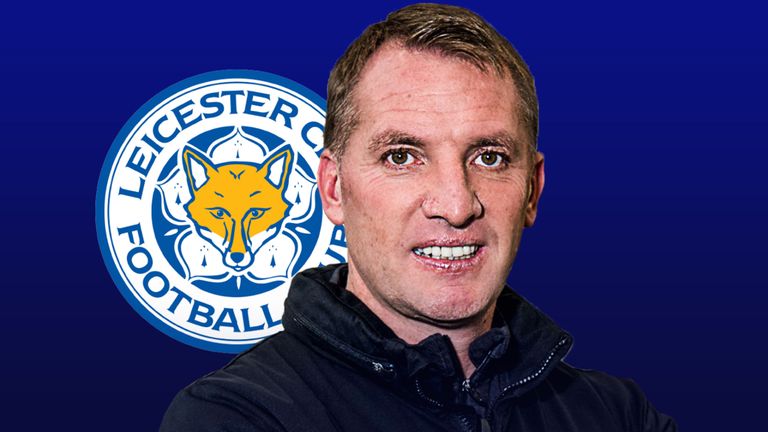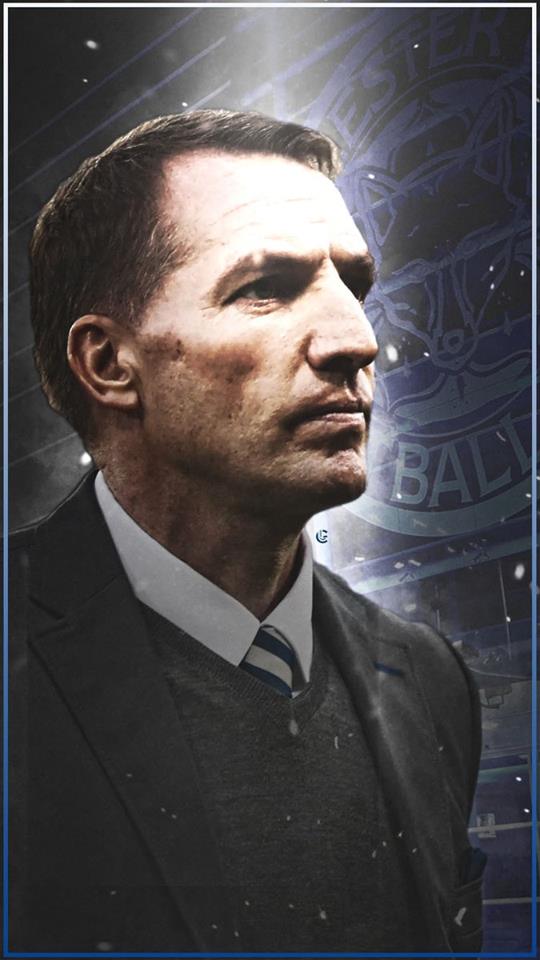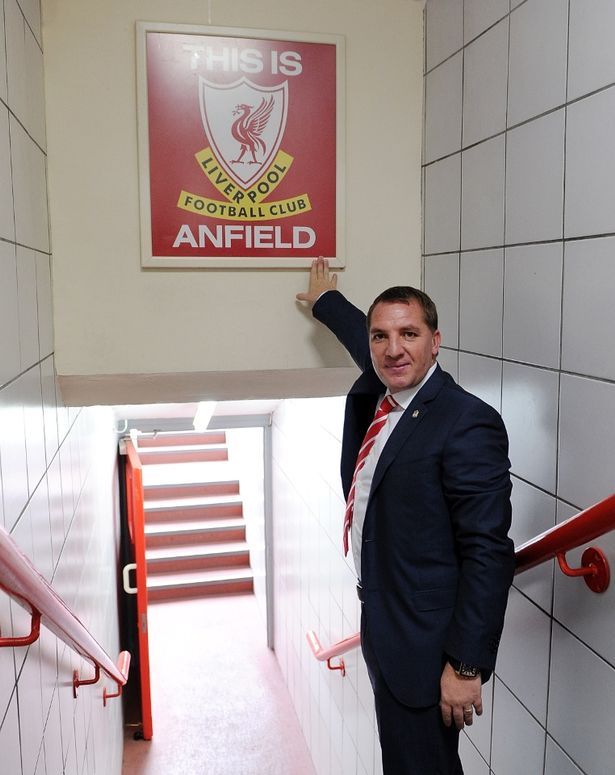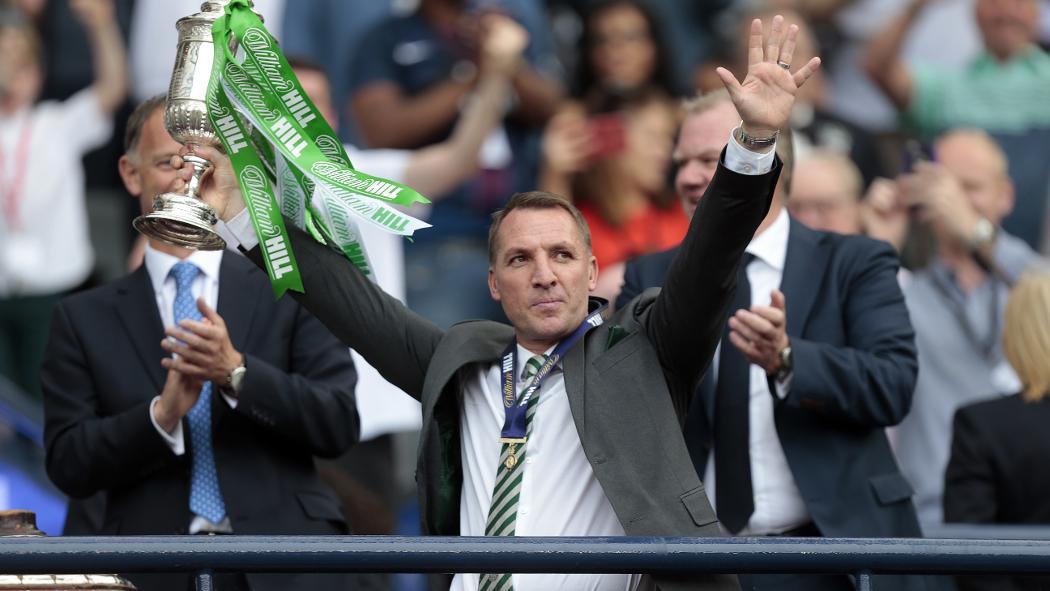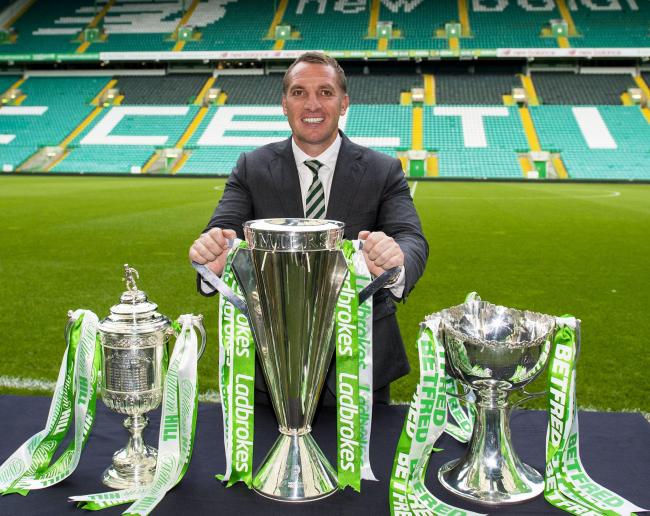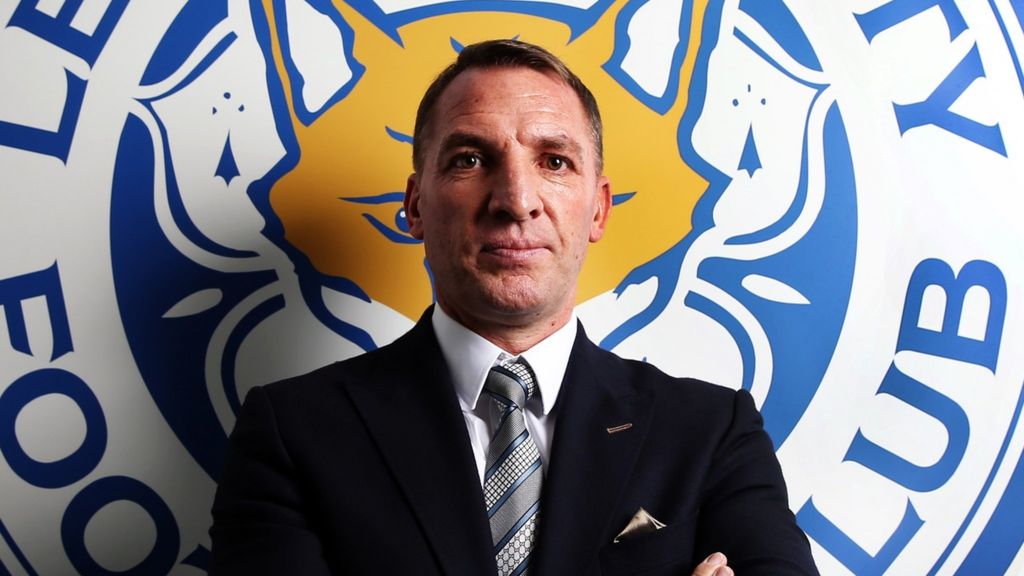Introducing New City Manager Brendan Rodgers
“The opportunity to speak with Leicester and find out their ambitions and where we can grow the Club and the training facility. Of course, the big attraction for me is working with the players. |
Brendan Rodgers’ Managerial Honours
|
Leicester City
Fa Cup Winners 2020/21 5th Place / Europa League 2020/21 5th Place / Europa League 2019/20 Celtic Scottish Premiership:- 2016/17, 2017/18 Scottish Cup:- 2016/17, 2017/18 Scottish League Cup:- 2016/17, 2017/18, 2018/19 Swansea City Championship Play-Offs:- 2010/11 Individual LMA Manager of the Year:-2013/14 PFA Scotland Manager of the Year:- 2016/17 SFWA Manager of the Year:- 2016/17 Scottish Premiership Manager of the Season:- 2016/17 Premier League Manager of the Month:- January 2012, August 2013, March 2014 Championship Manager of the Month:-February 2011 Scottish Premiership Manager of the Month:- August 2016, October 2016, December 2016, April 2017, September 2017 lcfc.com |
|
Chris Overton Welcome Brendan and your staff LTID
Pàm Bïlľ Đàvï-Nèthś Welcome you and your staff will get the right result for this club and we are grateful.
Kaðlin Ayríss welcome to the club
Judith Garner Welcome looking forward to some good results
Carla Till Welcome to Leicester Brendan! Have you still got Luis Suárez's phone number?
Mick Buck Kolo Kolo Kolo 🎶🎵🎶
Kate Bowlcott Welcome Brendan and team ! Looking forward to seeing what you can do at L C F C ! Thank you to Claud Puel and good luck with whatever you decide to do next xx
Marian Bradley Welcome to Leicester Brendan well pleased best of luck for you and our team looking forwards to the future
Chris Karatzis Rodgers it might take time but im glad your here
Andy Ritchie Welcome to Brendan and the team - get the lads passing and moving with pace!!
Gary Patrick Good luck Brendan and team excited about what you can achieve at Leicester
John Lloyd Welcome Brendan a breath of much needed fresh air, we have our Leicester back.
|
John Sheard Welcome to our club, do us proud
Andy Edwards Welcome
Jim Shires Welcome to LCFC Brendan .....a perfect match ....a manager with great ambition and a club with exactly the same!!
Robert Smith A warm welcome Brendan and the best of luck from us all. Blaaaaaaaaamy!
Paul Douglas Welcome to our Club
Its great to have you all here at the King Power . Onwards and Upwards Kay Lanes Welcome to LCFC,, Brendan and team. I have set myself a holiday task of composing a new song for you. Please help our boys to victory!
Paul Scotton Welcome Brendan Rogers hope you do us proud
John Grant Welcome to Leicester Brendan and Your Team.....Truly hope you can deliver a new age for our wonderful club.....Would say deliver our dreams but Claudio beat you to that lol. Good Luck sirs.
Kevo Gardner Welcome to one of the crazyest clubs in the world in my leicester city if you are as good as i think you are our great club and the best fans in the world are going to have a great ride WELCOME BRENDON RODGERS TO THE BLUE ARMY LTID
Phil Spouge Welcome to Leicester Brendan. Now let’s get this team sorted.
|
Dave Griffiths Welcome Brendan. Very happy to see you in this job at our club. You've made a very good decision as you will soon see. There is a fantastic opportunity here and the best owners in British football. Enjoy the ride!
Sarah Hearne Welcome to Leicester City Football Club Brendan
Ken Chards Charnock Welcome to the unbelievables Brendan. We have proved once before that the impossible is possible, nobody believes that it can happen twice. You have the owners, fans, players, ground and facilities to prove it can. No demands from me, just that we play with passion, fight and become the Leicester family playing with smiles on their faces once again. Get that right and success will follow. Looking forward to the future.
Glenis Morton Welcome Brendan and team looking good for the future .x
|
|
Brendan Rodgers arrives at Leicester City with a distinguished CV defined by his record-breaking management of some of the world's biggest football clubs.
Rodgers was born in Carnlough, Northern Ireland, in 1973 and joins the Foxes after winning a double of 'trebles' with Celtic, the 49-time champions of Scotland. During his two-and-a-half-year spell in Glasgow, Rodgers’ side also embarked on a staggering 69-game unbeaten run – the longest stretch in 100 years of British football. The 46-year-old leaves the Bhoys having won every domestic trophy he has contested over an unprecedented period of success. Following on from guiding Swansea City to becoming the first Welsh club to compete in the Premier League and establishing Liverpool as genuine title contenders, Rodgers holds a reputation as one of the game’s most respected and successful managers. In 1990, the young defender moved to Reading from local side Ballymena United, but a promising playing career was cut short by injury. Five years later, Reading called upon their former player to work within the academy in his 20s, where some players under him were a similar age. After heading to Spain to learn new coaching techniques, Rodgers accepted an invitation from José Mourinho to join Chelsea as head youth coach in 2004. Throughout these formative years, he continued to travel across Europe, visiting clubs such as Valencia CF, Sevilla FC and FC Barcelona, to exchange ideas and develop new philosophies. Within just two years, his ability to inspire the next generation led to a new position as reserve team coach – a role he also held under Avram Grant and Luiz Felipe Scolari. But in 2008, a job offer to be first team manager of Championship side Watford proved persuasive with the Hornets finishing the season in 13th-place. Following a short time with Reading, Rodgers' reputation for playing attractive football and promoting youth led to an approach from Swansea City in the summer of 2010. The departure of Paulo Sousa – who in fact joined Leicester City – presented an opening for Rodgers to take over a talented squad with promotion ambitions. Rodgers continued to impress as a manager and, by February, the ex-Ballymena United youth graduate had been named as Manager of the Month after securing five wins in six. A Play-Off berth was secured and a two-legged success over Nottingham Forest in the semi-finals set up a showpiece final at Wembley against former club Reading. A hat-trick from Scott Sinclair, who would also follow him to Celtic, sealed a 4-2 success in London, making Swansea the first-ever Welsh club to grace the Premier League. Before the new season, though, Rodgers embarked on a charity climb up Mount Kilimanjaro in Tanzania – and later dedicated his efforts to his parents. Rodgers' Swans started the 2011/12 season as favourites for relegation but a 3-0 win over West Bromwich Albion in September was an early indication of their prowess. Positive results against the likes of Liverpool, Newcastle United, Tottenham Hotspur and Chelsea, meanwhile, enabled them to secure a comfortable 11th-place finish. That season also included another personal accolade in the shape of the Manager of the Month award in January, after a 3-2 success over Arsène Wenger's Arsenal. |
|
Following the departure of Kenny Dalglish at Liverpool, though, an irresistible opportunity to manage 18-time champions and five-time European Cup winners Liverpool presented itself for Rodgers – a reward for years of encouraging progress. While his first season at Anfield ended with a seventh-place finish, his second term was a memorable one as the Merseyside club embarked on a serious title challenge.
With Luis Suárez and Daniel Sturridge scoring the goals, Steven Gerrard's midfield power providing the engine, and the guile of Philippe Coutinho, signed for a modest fee from Internazionale, the Reds played flowing, expressive football under Rodgers. Liverpool scored 101 league goals during the 2013/14 campaign, the club's highest tally since the 1895/96 season, and the third-highest in Premier League history. While Manchester City were eventually crowned as champions, Rodgers' ability to transform Liverpool’s fortunes and restore pride at Anfield led to several individual awards. In the summer, Rodgers was presented with the LMA Manager of the Year award, becoming the first Reds boss to clinch that title in over 20 years. A sixth-place finish during the following campaign also included a run to the semi-finals of the FA Cup, but Rodgers' tenure ended in October 2015 after a 1-1 draw at rivals Everton. The news came as a surprise considering the squad Rodgers, a cousin of former Foxes caretaker manager Nigel Worthington, had built at Anfield, but the following summer, another exciting opportunity to build a dynasty of success arose in Scotland at Celtic. |
|
Citing the size of their fanbase and the impact former Bhoys star Tommy Burns, a coach at Reading, had on his career, Rodgers promised to herald an era of success.
While his new side were tipped for domestic honours, the sheer extent of their dominance over Scottish football startled even the most optimistic of supporters. His first trophy was the club's 100th, a Scottish League Cup in November, while three consecutive victories over Rangers - for the first time - cemented Celtic's supremacy. By the end of 2016, the Bhoys were top of the Scottish Premiership with 58 points from a possible 60 and the title was secured in April before a 5-1 win over Rangers. In the end, Celtic were the first Scottish side to complete a top-flight season undefeated since 1899 with a margin of 30 points between them and Aberdeen. A 2-1 win over the Dons in the Scottish Cup final, meanwhile, sealed the treble for the fourth time in the club's history – prolonging their domestic unbeaten run for the length of an entire season under Rodgers’ management. The following term, in November, Celtic beat St Johnstone 4-0 to surpass a 100-year British record for consecutive domestic fixtures undefeated, standing at 62 matches.Later that month, a 2-0 success over Motherwell retained the Scottish League - before a defeat by Hearts finally ended Celtic's magnificent 69-game unbeaten run. Rodgers' second and Celtic's seventh successive title was sealed in unforgettable fashion, too, as a 5-0 rout of Rangers at Celtic Park extended their run of games without defeat by the Gers to 12 matches. Their unstoppable, trophy-laden march continued in May with a Scottish Cup title - via a 2-0 win over Motherwell - confirming the first-ever 'double treble' in Scottish history. The Northern Irishman's seventh and final piece of silverware at Celtic – with the help of Leicester City loanee Filip Benković – came as recently as November 2018 as Ryan Christie's solitary goal sealed a 1-0 win over Aberdeen in the Scottish League Cup Final. |
|
Upon joining the Club, Rodgers, the Club’s second Northern Irish full-time first team manager told LCFC TV: “I’d just like to say that I’m very privileged and honoured to be here as the manager.
“I promise that I’ll give my life to making them proud of their team and proud of their club, and I look forward to working with them because together we’re stronger. “It’s been a really difficult period, like I say, but my message is that together we’ll be stronger and on and off the pitch let’s make the right steps forward and I look forward to, like I say, making them proud of their team.” lcfc.com |
Brendan Rodgers explains timing behind his decision to join Leicester
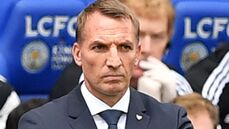
Brendan Rodgers has explained the timing behind his decision to leave Celtic and says he needed to join Leicester before the summer to prepare them for a top four tilt this season.
The Northern Irishman secured back-to-back trebles in his first two campaigns at Parkhead and laid the groundwork for a third before he departed for Leicester in February this year.
That decision was met with dismay by Celtic supporters, with some unveiling a banner reading 'You traded immortality for mediocrity. Never a Celt, always a fraud' against Hearts, while a video also emerged online showing fans allegedly chanting about Rodgers in a pub.
However, with Celtic securing another treble last season and Leicester now sitting second in the Premier League heading into the international break, Rodgers hopes fans will now understand the timing of his exit from Glasgow.
"I've said it many times, it was incredibly difficult," he told the Daily Record. "It was a really tough call from a personal perspective and a professional one because my relationship with everyone at the club was great from the boardroom to the dressing room.
"But perhaps now people will have a better understanding of why I made the choice to go when I did. I had a lot to think about at the time. The players were absolutely phenomenal for me in my time there. We were on this great journey together. We created a culture which I loved coming into every day. And we were winners.
The Northern Irishman secured back-to-back trebles in his first two campaigns at Parkhead and laid the groundwork for a third before he departed for Leicester in February this year.
That decision was met with dismay by Celtic supporters, with some unveiling a banner reading 'You traded immortality for mediocrity. Never a Celt, always a fraud' against Hearts, while a video also emerged online showing fans allegedly chanting about Rodgers in a pub.
However, with Celtic securing another treble last season and Leicester now sitting second in the Premier League heading into the international break, Rodgers hopes fans will now understand the timing of his exit from Glasgow.
"I've said it many times, it was incredibly difficult," he told the Daily Record. "It was a really tough call from a personal perspective and a professional one because my relationship with everyone at the club was great from the boardroom to the dressing room.
"But perhaps now people will have a better understanding of why I made the choice to go when I did. I had a lot to think about at the time. The players were absolutely phenomenal for me in my time there. We were on this great journey together. We created a culture which I loved coming into every day. And we were winners.
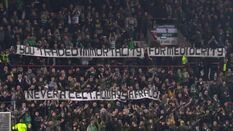
"We won - we were relentless at it and relentless in our work - and we had success together. So for me to then make the decision to leave them behind was not an easy thing to do. But I felt I had taken it as far as I could in that time. I then had a decision to make about going into a new project at Leicester where there is an ambition there and there are challenges that I would be excited by."
He added: "We were 27 games into a league campaign. We were clear at the top of the league, we had already won a cup and I felt I was leaving the club in a good state. OK, the timing wasn't ideal for many people but I felt the club was in a really good place, the players' mentality, everything around the club was healthy.
"But, because of how quickly it happened, it was probably difficult for some people to accept. But we've both moved on since then. Celtic moved on and won the treble which was brilliant. Three trebles consecutively, which is incredible.
"And I was able to come into Leicester and assess players while they were under pressure because that's when you can really make judgements. I felt it would give me those last 10 or 11 games of the season to assess what Leicester had and what needed to be done. It gave me the time to prepare for the summer so that we were ready to make a challenge at the start of this season. I think it's worked out well for both parties.
Sky Sports
He added: "We were 27 games into a league campaign. We were clear at the top of the league, we had already won a cup and I felt I was leaving the club in a good state. OK, the timing wasn't ideal for many people but I felt the club was in a really good place, the players' mentality, everything around the club was healthy.
"But, because of how quickly it happened, it was probably difficult for some people to accept. But we've both moved on since then. Celtic moved on and won the treble which was brilliant. Three trebles consecutively, which is incredible.
"And I was able to come into Leicester and assess players while they were under pressure because that's when you can really make judgements. I felt it would give me those last 10 or 11 games of the season to assess what Leicester had and what needed to be done. It gave me the time to prepare for the summer so that we were ready to make a challenge at the start of this season. I think it's worked out well for both parties.
Sky Sports
Brendan Rodgers' success since Reading sacking shows the dangers of judging managers too soon

Ten years on from Brendan Rodgers' sacking at Reading, Adam Bate from Sky Sports assesses what went wrong there and what we can learn from the subsequent success that has seen him thrive elsewhere...
Have you heard the one about the St Mirren chairman who declared in a tribunal over the sacking of Sir Alex Ferguson that the Scot had "no managerial ability". How about Carlo Ancelotti? Sacked by Parma after famously deciding that he could find no way to accommodate the talents of Roberto Baggio in his system. As for Manuel Pellegrini, his first job in a long and successful managerial career ended in relegation for Universidad de Chile, the now 18-time champions.
All three men went on to win the Premier League. Even the great and the good have had their moments in this most unforgiving of industries. Crucially, they had the sense to make their early mistakes somewhere else.
On the tenth anniversary of Brendan Rodgers' sacking at Reading, perhaps it is the perfect time to acknowledge that reputations need not stick. Right now, Rodgers is among the most celebrated coaches in the country. He has transformed Leicester City into a Champions League team in waiting. Three years on from Andrea Bocelli and all that, there are supporters along Filbert Way saying that the miracle was one thing but this lot are even better - and they mean it too.
It has taken a long time for Rodgers to earn these kind of plaudits. Too long. Speaking to him at the King Power Stadium recently for a piece on the success of Raheem Sterling, he had an interesting take on why the Manchester City forward has found himself the subject of such a mixed press during his rise to the top of his profession.
"British players, British managers, get judged slightly differently."
Have you heard the one about the St Mirren chairman who declared in a tribunal over the sacking of Sir Alex Ferguson that the Scot had "no managerial ability". How about Carlo Ancelotti? Sacked by Parma after famously deciding that he could find no way to accommodate the talents of Roberto Baggio in his system. As for Manuel Pellegrini, his first job in a long and successful managerial career ended in relegation for Universidad de Chile, the now 18-time champions.
All three men went on to win the Premier League. Even the great and the good have had their moments in this most unforgiving of industries. Crucially, they had the sense to make their early mistakes somewhere else.
On the tenth anniversary of Brendan Rodgers' sacking at Reading, perhaps it is the perfect time to acknowledge that reputations need not stick. Right now, Rodgers is among the most celebrated coaches in the country. He has transformed Leicester City into a Champions League team in waiting. Three years on from Andrea Bocelli and all that, there are supporters along Filbert Way saying that the miracle was one thing but this lot are even better - and they mean it too.
It has taken a long time for Rodgers to earn these kind of plaudits. Too long. Speaking to him at the King Power Stadium recently for a piece on the success of Raheem Sterling, he had an interesting take on why the Manchester City forward has found himself the subject of such a mixed press during his rise to the top of his profession.
"British players, British managers, get judged slightly differently."
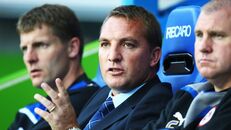
Rodgers doesn't come across as someone weighed down by grievances, but it would be understandable if such thoughts had occasionally crept in. That infamous Liverpool documentary didn't help, of course, but there was always a sense that he was someone who should know his place. Others were allowed to be Special. Not him.
Having gone away and won trophies galore with Celtic, Rodgers has returned with less to prove and more to offer. Maybe there is a lesson there. Because just as Sterling's issues in front of goal as a youngster saw his potential for greatness too readily dismissed, even the best managers in the game do not arrive onto the scene fully formed either.
Like everything from sausage-making to law-making, while the end product can be great, watching the process behind it isn't always pretty.That was certainly the case at Reading. And yet, there were signs, even during the darkest days at the Madejski Stadium, for those prepared to look past the 11 defeats that threatened to kill his career before it had begun.
"Every day in training, we would never do the same session twice," Brian Howard tells Sky Sports. "He was always trying different things so you had that buzz of going into training every day looking forward to what the new challenges would be." Howard is not a Leicester player. He didn't play under Rodgers at Celtic, Liverpool or Swansea. He is referring to his old manager's unloved spell at Reading, a sixth month stint that some supporters still deem excusable only because of the brevity of its duration.
Howard, now a respected agent, remembers it differently. "He was the reason why I went there," he recalls. "I was at Sheffield United and we played pretty direct football under Kevin Blackwell. But he wanted to play a different way and earmarked me as the attacking midfielder in how he sets his team up. He sold it to me. It was what I wanted to hear. It was perfect for me.
"Brendan came in and completely changed the philosophy at Reading. It was all about getting the ball down. He wanted the centre-halves to split, to play out from the back and for the midfielders to get on the ball. It was a real change. It was a long-term job and a complete rebuild so it was always going to take time. He just wasn't given that time."
Having gone away and won trophies galore with Celtic, Rodgers has returned with less to prove and more to offer. Maybe there is a lesson there. Because just as Sterling's issues in front of goal as a youngster saw his potential for greatness too readily dismissed, even the best managers in the game do not arrive onto the scene fully formed either.
Like everything from sausage-making to law-making, while the end product can be great, watching the process behind it isn't always pretty.That was certainly the case at Reading. And yet, there were signs, even during the darkest days at the Madejski Stadium, for those prepared to look past the 11 defeats that threatened to kill his career before it had begun.
"Every day in training, we would never do the same session twice," Brian Howard tells Sky Sports. "He was always trying different things so you had that buzz of going into training every day looking forward to what the new challenges would be." Howard is not a Leicester player. He didn't play under Rodgers at Celtic, Liverpool or Swansea. He is referring to his old manager's unloved spell at Reading, a sixth month stint that some supporters still deem excusable only because of the brevity of its duration.
Howard, now a respected agent, remembers it differently. "He was the reason why I went there," he recalls. "I was at Sheffield United and we played pretty direct football under Kevin Blackwell. But he wanted to play a different way and earmarked me as the attacking midfielder in how he sets his team up. He sold it to me. It was what I wanted to hear. It was perfect for me.
"Brendan came in and completely changed the philosophy at Reading. It was all about getting the ball down. He wanted the centre-halves to split, to play out from the back and for the midfielders to get on the ball. It was a real change. It was a long-term job and a complete rebuild so it was always going to take time. He just wasn't given that time."
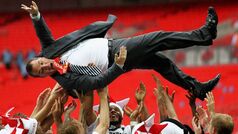
Rodgers has since acknowledged some errors. He approached the challenge with a long-term view, rather than protecting his position in the short term. He trusted in youth. Shane Long, Gylfi Sigurdsson, Ryan Bertrand, Hal Robson-Kanu, Alex Pearce, Simon Church and Jem Karacan featured regularly. Long was the oldest among them at just 22 years old.
The Northern Irishman would not be the first or last former youth coach to discover that the difference between performances and results can also be the difference between a regular pay cheque and a one-time pay-off. "Maybe it was too many at one time," says Howard.
"We were controlling games and outplaying teams but we just could not get the ball in the net," he adds. "We would have 60 to 70 per cent possession in games but end up losing them because of a set piece. So he always was that coach but when he does it now he makes sure he gets the striker right. Everything else fits in around that. "In some of the games, we were playing the football that Leicester are playing now. But we just didn't have a Jamie Vardy. We didn't have that person to stick the ball in the net."
For Howard, that remains a regret. "I broke my jaw early on and by the time I was fit again the club had sacked him," he adds. "I was unfortunate because he would have improved me. I was improving every day as a player. He always improves players and makes players and teams better. I would like to have seen him given more time because I think the results would have come."
In a sense, the point is moot. The following season culminated in a play-off final between Reading and Rodgers' new club Swansea at Wembley. It wasn't close. Swansea were three up by half-time and went on to win 4-2. Howard could only watch on from the bench.
"The way he got them playing…" Ten years on from that misstep with Reading, Rodgers has little cause to look back himself. But maybe the rest of us should. Coaches learn from their mistakes as well as their triumphs - and sometimes they aren't even mistakes at all. Twenty-three games weren't even enough to determine the difference. After a decade of work, a truer picture has emerged.
The Northern Irishman would not be the first or last former youth coach to discover that the difference between performances and results can also be the difference between a regular pay cheque and a one-time pay-off. "Maybe it was too many at one time," says Howard.
"We were controlling games and outplaying teams but we just could not get the ball in the net," he adds. "We would have 60 to 70 per cent possession in games but end up losing them because of a set piece. So he always was that coach but when he does it now he makes sure he gets the striker right. Everything else fits in around that. "In some of the games, we were playing the football that Leicester are playing now. But we just didn't have a Jamie Vardy. We didn't have that person to stick the ball in the net."
For Howard, that remains a regret. "I broke my jaw early on and by the time I was fit again the club had sacked him," he adds. "I was unfortunate because he would have improved me. I was improving every day as a player. He always improves players and makes players and teams better. I would like to have seen him given more time because I think the results would have come."
In a sense, the point is moot. The following season culminated in a play-off final between Reading and Rodgers' new club Swansea at Wembley. It wasn't close. Swansea were three up by half-time and went on to win 4-2. Howard could only watch on from the bench.
"The way he got them playing…" Ten years on from that misstep with Reading, Rodgers has little cause to look back himself. But maybe the rest of us should. Coaches learn from their mistakes as well as their triumphs - and sometimes they aren't even mistakes at all. Twenty-three games weren't even enough to determine the difference. After a decade of work, a truer picture has emerged.
Brendan Rodgers was tactical genius at 18, says former boss who picked his brains with Newbury Town Reserves
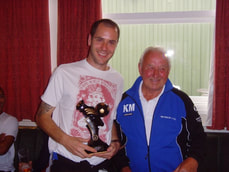 Keith Moss, right, learned a lot from a young Brendan RodgersCredit: Newbury Town FC
Keith Moss, right, learned a lot from a young Brendan RodgersCredit: Newbury Town FC
IT was half-time and Newbury Town reserves were trailing 2-0 and facing a big defeat.
Suddenly, their mud-splattered teenage winger dashed into the dressing room and took manager, Keith Moss, to a quiet corner for a tactical chat.
He picked up a pen and began to draw on a discarded match-day programme. For the entire 15-minute break, he spoke non-stop while his bemused boss nodded in agreement to every word.
Moss made the recommended changes, totally altered the system, and Newbury won 3-2. Brendan Rodgers, who was just 18 then, had plotted his very first ‘managerial’ triumph. A modest match in the Diadora League that earned him a paltry £7 — but he was broke and desperate for every penny.
Little did he realise that on an ice-cold day in West Berkshire, he had launched himself on to football’s prestigious Millionaire’s Row. Moss, who is now 80, said: “I was overwhelmed. He had an astonishing insight into the game for someone so young. He had remarkable vision. “Brendan was a decent left-winger but it was his strategy and game plans that made him different. “There were times when I couldn’t keep up with him. “Many times I sounded him out and picked his young brains without him knowing.
“I was the manager and he was just a lad and I was learning from him. Thanks, Brendan!”
Leicester boss Rogers, 46, was also a star on the club pool table. Moss recalled: “We had a chap called Dickie Jones, who had never lost at pool and he challenged Brendan and put £10 down on the table. “Everyone at the club crowded round to watch them. You could have cut the tension with a knife.
“Brendan beat him and was crowned champion. Dickie declined a rematch — and he was never seen again. I watched Brendan closely. He fascinated me. He treated it like a football match. “He had strategy, and was always a couple of moves ahead. “Brendan was quiet, polite, never late and definitely superstitious.
“He always put his left boot on first and went through a strange routine before going on the field.” Rodgers virtually lived at Newbury’s Faraday Road ground, marking out the pitch with wobbly white lines, helping a carpenter to build the clubhouse bar and talking endlessly with Moss about selections and systems — and always with a big smile on his face. Manchester United’s wizard Ryan Giggs, a left-winger like Rodgers, was his idol.
He was penniless and paid his way by sharing rooms with Newbury Town pal, Steve Kean, who also went on to be a Premier League manager with Blackburn between 2010-12. Moss smiled and added: “What I’d really like is for Brendan to stop off for a few minutes when travelling to a match and we could have a quick chat.
“We could have a chat about his time here, where it all began, and how different it was then, when we went to clubs like Lewes, Thame and Tilbury.
Oh, happy days...”
The Sun
Suddenly, their mud-splattered teenage winger dashed into the dressing room and took manager, Keith Moss, to a quiet corner for a tactical chat.
He picked up a pen and began to draw on a discarded match-day programme. For the entire 15-minute break, he spoke non-stop while his bemused boss nodded in agreement to every word.
Moss made the recommended changes, totally altered the system, and Newbury won 3-2. Brendan Rodgers, who was just 18 then, had plotted his very first ‘managerial’ triumph. A modest match in the Diadora League that earned him a paltry £7 — but he was broke and desperate for every penny.
Little did he realise that on an ice-cold day in West Berkshire, he had launched himself on to football’s prestigious Millionaire’s Row. Moss, who is now 80, said: “I was overwhelmed. He had an astonishing insight into the game for someone so young. He had remarkable vision. “Brendan was a decent left-winger but it was his strategy and game plans that made him different. “There were times when I couldn’t keep up with him. “Many times I sounded him out and picked his young brains without him knowing.
“I was the manager and he was just a lad and I was learning from him. Thanks, Brendan!”
Leicester boss Rogers, 46, was also a star on the club pool table. Moss recalled: “We had a chap called Dickie Jones, who had never lost at pool and he challenged Brendan and put £10 down on the table. “Everyone at the club crowded round to watch them. You could have cut the tension with a knife.
“Brendan beat him and was crowned champion. Dickie declined a rematch — and he was never seen again. I watched Brendan closely. He fascinated me. He treated it like a football match. “He had strategy, and was always a couple of moves ahead. “Brendan was quiet, polite, never late and definitely superstitious.
“He always put his left boot on first and went through a strange routine before going on the field.” Rodgers virtually lived at Newbury’s Faraday Road ground, marking out the pitch with wobbly white lines, helping a carpenter to build the clubhouse bar and talking endlessly with Moss about selections and systems — and always with a big smile on his face. Manchester United’s wizard Ryan Giggs, a left-winger like Rodgers, was his idol.
He was penniless and paid his way by sharing rooms with Newbury Town pal, Steve Kean, who also went on to be a Premier League manager with Blackburn between 2010-12. Moss smiled and added: “What I’d really like is for Brendan to stop off for a few minutes when travelling to a match and we could have a quick chat.
“We could have a chat about his time here, where it all began, and how different it was then, when we went to clubs like Lewes, Thame and Tilbury.
Oh, happy days...”
The Sun


